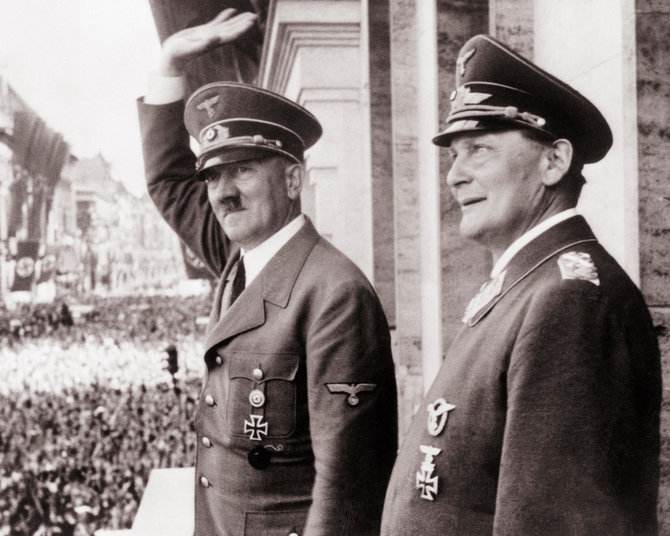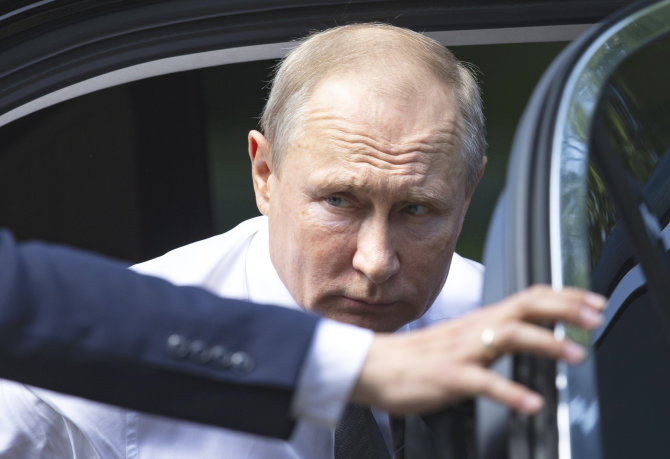He noticed that, according to the data of organizations following the progress of democracy, since 2005 The level of democracy in the world has decreased every year after the period from 1974. until 2004 truly experienced a renaissance and made progress.
Unfortunately, this time is more reminiscent of the 20th century. the forties, so many are carefully analyzing why everything turned out so badly then, noted A. Aslundas.
In that fateful period, the face of the world dictatorship was Adolf Hitler, and today it is V. Putin. The analyst believes that the increasingly frequent juxtaposition of these two tyrants can really say a lot about the Russian leader and today’s Russia.
“The further you go, the more similar the rules of A. Hitler and V. Putin look,” added the professor, who has consulted the governments of Russia and Ukraine.
“Both Hitler and Putin are clever politicians who have been greatly underestimated. They began their rule with broad appeals and strengthened their rule rather in stages. Both saw to it that the legal system and parliament became incapacitated early on. They acted hard and fast and used three sources of power: popular support, tough propaganda and state repression.”
A. Aslund also drew attention to the similarities in their chosen economic strategy: politically, A. Hitler turned to small business, but, like V. Putin, he quickly turned to big businessmen (as long as they were not Jewish).
“Both co-opted oligarchs and did not care about small businessmen. They prospered because of early economic gains, but they didn’t really care about the economy, and they didn’t suffer a loss of popular support because of later economic failures,” he taught.
In his speech, justifying the war with Poland, A. Hitler sounded apologetic: the Poles were so terrible that they forced him to start this war, which was provoked by the Gliwice provocation. Similarly, V. Putin said that he did not want to invade Ukraine, but bad Ukrainians forced him to do it.
The 1940s were a time of great regulation and protectionism, so early rationalization and price controls in Germany were natural.
“It’s surprising that neither Russia nor Ukraine have been forced to introduce rationing or price controls, because the free market and modern logistics work very well. It made the war more tolerable.”
The analyst noticed that big businessmen did well under A. Hitler, so they did not oppose him. The same applies to big business under Putin: “They have too much to lose.”
Despite all the Allied bombing of Germany and its arms factories during World War II, German arms production peaked in 1944. July. According to A. Aslund, Western sanctions are unlikely to stop Russian arms production either, although they may reduce its quality and volume.
“In his speech, justifying the war with Poland, A. Hitler sounded apologetic: the Poles were so terrible that they forced him to start this war, which was provoked by the Gliwice provocation. Similarly, V. Putin said that he did not want to invade Ukraine, but bad Ukrainians forced him to do it. A. Hitler’s rhetoric is explained by the fact that in 1939 The war was unpopular in Germany, unlike in 1914. It is likely that the Kremlin had a similar understanding of the attitude of the Russian people to the war in 2022,” the professor drew parallels.
When their wars began, the nature of Hitler’s and Putin’s regimes seemed to coincide.
“For A. Hitler, ideology and propaganda were always the most important. For V. Putin, they became more and more like that. A. Hitler spoke enthusiastically about the mythological thousand years the reichalthough the German Reich existed only from 1871.
Similarly, V. Putin talks about the mythological millennial Russia, ignoring the fact that Russia was Ukrainian, Peter I founded the Russian Empire only in 1721, and the Russian Federation was proclaimed in 1991. A. Hitler urged to strive habitatand V. Putin fosters imperialism Russian mir. Their common problem is imperial decay.”
A. Aslundas drew attention to the views of both dictators: although A. Hitler was always anti-Semitic, but only in 1942. In January, at the Wannsee Conference, he announced the destruction of the Jewish people as a goal. V. Putin behaved similarly in 2008. after declaring that Ukraine is not a nation at the NATO summit in Bucharest in April. However, only recently did he call for the liquidation, that is, the genocide of the Ukrainian nation.
“In both cases, the idea of genocide as the ultimate goal developed gradually,” the analyst observed.
A. Hitler’s and V. Putin’s attitude towards their army has always been similar – disdainful, A. Aslund makes another insight.
“A. Hitler in 1938 declared himself the commander-in-chief of the army before the war, V.Putin practically did the same. Both regarded their generals as cowards and ordered bolder operations. They used their wars to seize the wealth of their enemies and increase repression. War became an essential part of their increasingly faltering legitimacy. Putin shouts that his war is existential. Yes, probably for him, but for Russia his war is harmful.”
Since 1942 As World War II turned against Germany, those who had failed in the war, such as Air Force Commander Hermann Goering, lost influence, and Hitler himself undermined his authority.
Germans under A. Hitler, like most Russians under V. Putin, had made many personal compromises with the regime, so they felt personal guilt.
“The biggest winner was propagandist-in-chief Joseph Goebbels, who could not be embarrassed by any defeat from Stalingrad to Kursk. Aren’t we seeing the same phenomenon today when the Russian media glorifies Dmitry Peskov, Vladimir Solovyov, Margarita Simonyan and other genocidal propagandists – the more scandalous the better?”
German historians have a hard time understanding why there was no noise against A. Hitler. Instead, empty resignation prevailed.
German historian Norbert Frei, who expressed a similar opinion to A. Aslund, offers a convincing explanation: “Silence was not only an expression of endless disappointment and bitterness; sometimes it was also a sign of shame.”
“Germans under A. Hitler, like most Russians under V. Putin, had made many personal compromises with the regime, so they felt personal guilt.
A strange source of legitimacy for A. Hitler, which probably applies to V. Putin as well, was that many believed that only A. Hitler had the authority to end the war. Here in Washington, I hear too many foreign policy experts who think the same about V. Putin,” the professor taught.
In his opinion, the presented comparison allows us to draw useful conclusions: V. Putin did not think that the war would be popular, so he presented Russia as a victim, not as an aggressor, and his stance in favor of the Ukrainian genocide is only an expression of his desperation.
“V. Putin understands that the war is going badly, so he relies more on propagandists than on generals. He doesn’t really care about the economy, but he trusts the oligarchs to keep the weapons production going until the end. A. Hitler was not a winner. V. Putin doesn’t look like that either,” summed up A. Aslund.
Source: www.15min.lt




